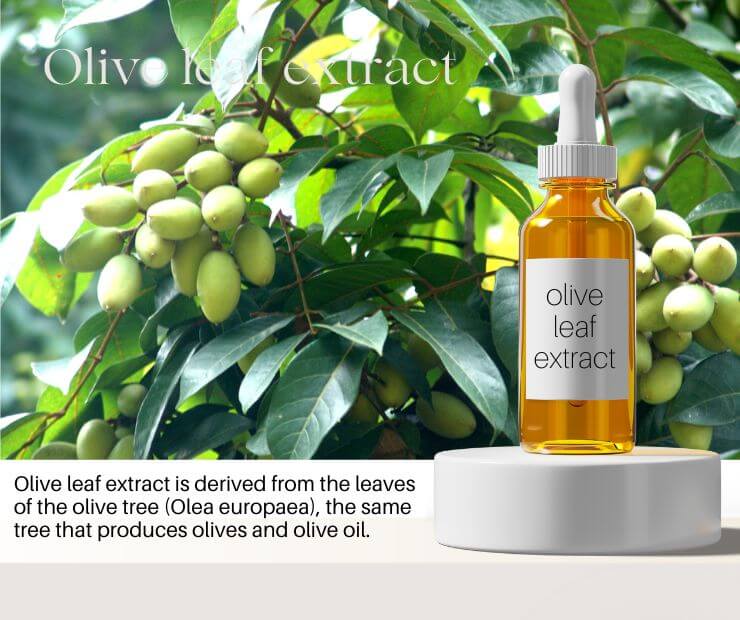Olive leaf extract is derived from the leaves of the olive tree (Olea europaea), the same tree that produces olives and olive oil. The extract has gained popularity in recent years due to its potential health benefits and various applications.
Olive Tree: A Symbol of Peace, Stability, and Abundance
The olive tree has provided humans with food and shelter since the beginning of history. It is generally believed to have originated over 5,000 years ago along the Mediterranean coast and was first brought to America in the 15th century. There is evidence that drinking tea brewed from olive leaves has been a traditional remedy in the Middle East for hundreds of years, used to treat ailments such as coughs, sore throats, cystitis, and fevers. Additionally, olive leaf ointments have been used for treating boils, rashes, warts, and other skin conditions.
It was not until the early 18th century that olive leaves began to attract the attention of medical institutions. A French army colonel and physician, Dr. Etienne Pallas, analyzed the components of olive leaves and isolated a crystallizable substance he named “strychnine,” a type of bitter compound believed to have strong antipyretic properties. This discovery marked the beginning of modern research on olive leaf extract.
Olive leaf extract is an orally administered broad-spectrum antimicrobial agent. The most active compound identified in olive leaves is oleuropein, a bitter secoiridoid glycoside belonging to the iridoid class. Oleuropein and its hydrolysis products play a crucial role in the antimicrobial properties of olive leaves.
Chemical Composition
Olive leaves mainly contain secoiridoids and their glycosides, flavonoids and their glycosides, biflavonoids and their glycosides, as well as low molecular weight tannins. Secoiridoids are the primary active components.
The main constituents of olive leaf extract are bitter secoiridoid compounds, among which oleuropein and hydroxytyrosol exhibit the highest bioactivity. These compounds are widely used in health supplements and cosmetics.
Key Points:
History and Traditional Use:
- Olive trees have been cultivated for thousands of years, and their leaves were historically used in traditional medicine.
- Ancient civilizations, including the Greeks and Egyptians, recognized the medicinal properties of olive leaves.
Nutrient-Rich Composition:
- Olive leaf extract contains a variety of compounds, including polyphenols, flavonoids, and oleuropein.
- Oleuropein is a key component known for its antioxidant and anti-inflammatory properties.
Antioxidant Properties:
- One of the primary benefits of olive leaf extract is its powerful antioxidant content.
- Antioxidants help neutralize free radicals, which can contribute to oxidative stress and various health issues.
Immune System Support:
- Studies suggest that olive leaf extract may have immune-boosting properties.
- It is believed to support the body’s defense mechanisms against infections and illnesses.
Cardiovascular Health:
- Olive leaf P.E. has been linked to cardiovascular benefits, including potential improvements in blood pressure and cholesterol levels.
- These effects contribute to heart health and may reduce the risk of cardiovascular diseases.
Anti-Inflammatory Effects:
- The extract is thought to possess anti-inflammatory properties, making it potentially beneficial for conditions involving inflammation.
Versatile Uses:
- Olive leaf P.E. is available in various forms, such as capsules, liquid supplements, and topical creams.
- It is used not only as a dietary supplement but also in skincare products due to its potential benefits for the skin.
Culinary Applications:
- Beyond supplements and skincare, olive leaf extract can be used in cooking.
- It adds a unique flavor and can be incorporated into various dishes for both taste and potential health benefits.
In summary, olive leaf P.E. is a versatile and natural supplement with a rich history of traditional use. Its antioxidant, anti-inflammatory, and immune-boosting properties make it a subject of interest for those seeking natural ways to support their health and well-being. As with any supplement, it’s advisable to consult with a healthcare professional before incorporating it into your routine.








